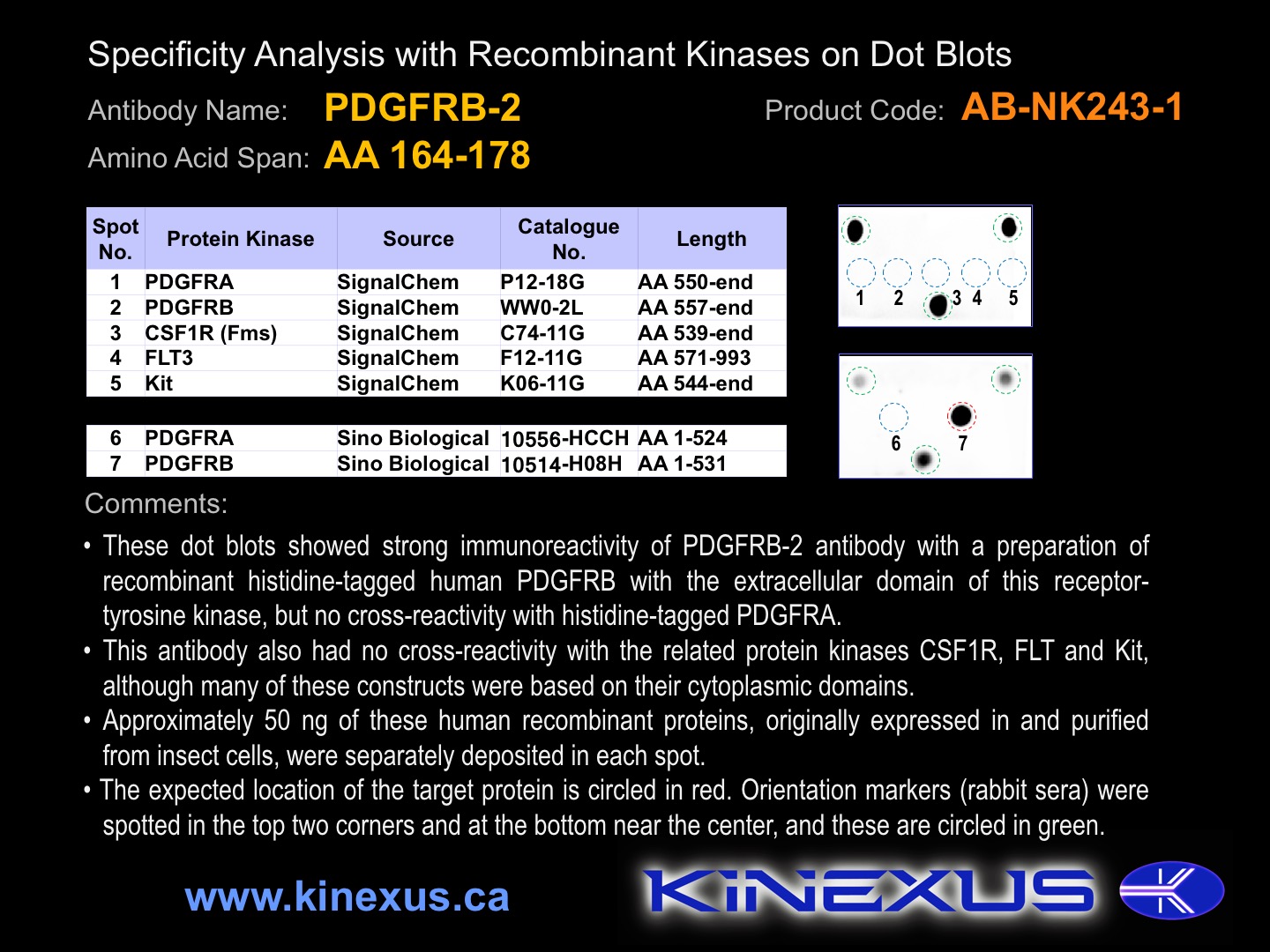Product Name: PDGFRB-2
Product Number: AB-NK243-1
| Size: | 25 µg | Price: | 89.00 | |
| $US |
Target Full Name: Platelet-derived growth factor receptor kinase beta
Target Alias: CD140b; JTK12; Kinase PDGFR-beta; PDGFR; PDGFR1; PDGFRb; PDGFR-beta; PDGF-R-beta; Platelet-derived growth factor receptor, beta polypeptide; BC032224; J03278; M21616; CCDS4303.1; ENSG00000113721
Product Type Specific: Protein kinase pan-specific antibody
Antibody Code: NK243-1
Antibody Target Type: Pan-specific
Protein UniProt: P09619
Protein SigNET: P09619
Antibody Type: Polyclonal
Antibody Host Species: Rabbit
Antibody Immunogen Source: Human PDGFRb sequence peptide Cat. No.: PE-01AUY99
Target Alias: CD140b; JTK12; Kinase PDGFR-beta; PDGFR; PDGFR1; PDGFRb; PDGFR-beta; PDGF-R-beta; Platelet-derived growth factor receptor, beta polypeptide; BC032224; J03278; M21616; CCDS4303.1; ENSG00000113721
Product Type Specific: Protein kinase pan-specific antibody
Antibody Code: NK243-1
Antibody Target Type: Pan-specific
Protein UniProt: P09619
Protein SigNET: P09619
Antibody Type: Polyclonal
Antibody Host Species: Rabbit
Antibody Immunogen Source: Human PDGFRb sequence peptide Cat. No.: PE-01AUY99
Antibody Immunogen Sequence: CKGDVALPVPYDHQRG
Antibody Immunogen Description: Corresponds to amino acid residues K164 to G178
Production Method: The immunizing peptide was produced by solid phase synthesis on a multipep peptide synthesizer and purified by reverse-phase hplc chromatography. Purity was assessed by analytical hplc and the amino acid sequence confirmed by mass spectrometry analysis. This peptide was coupled to KLH prior to immunization into rabbits. New Zealand White rabbits were subcutaneously injected with KLH-coupled immunizing peptide every 4 weeks for 4 months. The sera from these animals was applied onto an agarose column to which the immunogen peptide was thio-linked. Antibody was eluted from the column with 0.1 M glycine, pH 2.5. Subsequently, the antibody solution was neutralized to pH 7.0 with saturated Tris.
Antibody Immunogen Description: Corresponds to amino acid residues K164 to G178
Production Method: The immunizing peptide was produced by solid phase synthesis on a multipep peptide synthesizer and purified by reverse-phase hplc chromatography. Purity was assessed by analytical hplc and the amino acid sequence confirmed by mass spectrometry analysis. This peptide was coupled to KLH prior to immunization into rabbits. New Zealand White rabbits were subcutaneously injected with KLH-coupled immunizing peptide every 4 weeks for 4 months. The sera from these animals was applied onto an agarose column to which the immunogen peptide was thio-linked. Antibody was eluted from the column with 0.1 M glycine, pH 2.5. Subsequently, the antibody solution was neutralized to pH 7.0 with saturated Tris.
Antibody Modification: Unconjugated. Contact KInexus if you are interest in having the antibody biotinylated or coupled with fluorescent dyes.
Antibody Concentration: 1 mg/ml
Storage Buffer: Phosphate buffered saline pH 7.4, 0.05% Thimerasol
Storage Conditions: For long term storage, keep frozen at -40°C or lower. Stock solution can be kept at +4°C for more than 3 months. Avoid repeated freeze-thaw cycles.
Product Use: Western blotting | Antibody microarray
Antibody Dilution Recommended: 2 µg/ml for immunoblotting
Antibody Potency: Medium-strong immunoreactivity with recombinant human PDGFRA on protein dot blots.
Antibody Species Reactivity: Human
Antibody Concentration: 1 mg/ml
Storage Buffer: Phosphate buffered saline pH 7.4, 0.05% Thimerasol
Storage Conditions: For long term storage, keep frozen at -40°C or lower. Stock solution can be kept at +4°C for more than 3 months. Avoid repeated freeze-thaw cycles.
Product Use: Western blotting | Antibody microarray
Antibody Dilution Recommended: 2 µg/ml for immunoblotting
Antibody Potency: Medium-strong immunoreactivity with recombinant human PDGFRA on protein dot blots.
Antibody Species Reactivity: Human
Antibody Positive Control: The observed molecular mass of the processed target protein on SDS-PAGE gels is reported to be around 115-130 kDa.
Antibody Specificity: High
Antibody Cross Reactivity: No immunoreactivity on protein dot blots with recombinant human PDGFRA.
Related Product 1: PDGFRB-2 blocking peptide
Related Product 2: PDGFRA-1 pan-specific antibody (Cat. No.: AB-NK242-1)
Related Product 3: PDGFRA-2 pan-specific antibody (Cat. No.: AB-NK242-2)
Related Product 4: PDGFRa-pS847+pY849 phosphosite-specific antibody (Cat. No.: AB-PK757)
Related Product 5: PDGFRa-pY762 phosphosite-specific antibody (Cat. No.: AB-PK758)
Antibody Specificity: High
Antibody Cross Reactivity: No immunoreactivity on protein dot blots with recombinant human PDGFRA.
Related Product 1: PDGFRB-2 blocking peptide
Related Product 2: PDGFRA-1 pan-specific antibody (Cat. No.: AB-NK242-1)
Related Product 3: PDGFRA-2 pan-specific antibody (Cat. No.: AB-NK242-2)
Related Product 4: PDGFRa-pS847+pY849 phosphosite-specific antibody (Cat. No.: AB-PK757)
Related Product 5: PDGFRa-pY762 phosphosite-specific antibody (Cat. No.: AB-PK758)
Related Product 6: PDGFRa-pY768 phosphosite-specific antibody (Cat. No.: AB-PK759)
Related Product 7: PDGFRB-4 pan-specific antibody (Cat. No.: AB-NK243-3)
Related Product 8: PDGFRSubtide - PDGFRA protein kinase substrate peptide
Related Product 7: PDGFRB-4 pan-specific antibody (Cat. No.: AB-NK243-3)
Related Product 8: PDGFRSubtide - PDGFRA protein kinase substrate peptide
Scientific Background: PDGFRB is a receptor protein-tyrosine kinase in the TK family and PDGFR group. It acts as a cell surface receptor for PDGFA, PDGFB, and PDGFC. It is highly expressed and widely distributed in most tested human tissues. Orthologues are highly conserved in mammals and birds. PDGFRB is activated by binding platelet-derived growth factor. Autophosphorylation of Y579, Y581, Y716, Y740 and Y751 increases PDGFRB kinase activity. Protein interactions are induced with phosphorylation of Y716 (with Grb2 & Grb7), Y579 (with PIK3R1, PLCg1, RasGAP, Shc1 & Src), Y581 (with PIK3R1, PLCg1, RasGAP & Src), Y740 and Y751 (with PIK3C2A, PIK3CA, PIK3R1 & Shc1), Y763 (with SHP2), Y771 (with RasGAP and Shc1), Y775 (with Grb7), Y1009 (with Cbl, PLCg1, SH3KBP1 & SHP2), and Y1021 (with PLCg1). Phosphorylation of Y1009 inhibits binding to PIK3R1 and RasGAP. PDGFRb-deficient mice are hemorrhagic, severely anemic and exhibit a defect in kidney glomeruli function. PDGFRb expression and activity is elevated in several cancers and inhibition of PDGFRb activity blocks progression of renal carcinoma in an animal model. The active form of the protein kinase normally acts to promote tumour cell proliferation. R561C and P660T mutations in PDGFRB are associated with myofibromatosis, infantile 1. A translocation between chromosomes 5 and 12 that fuses this gene to that of the translocation, results in chronic myeloproliferative disorder with eosinophilia. PDGFRB has also been linked with myeloproliferative disorders, metastatic medulloblastomas, breast carcinomas and gastric adenocarcinomas. Insertional mutagenesis studies in mice also support a role for this protein kinase in mouse cancer oncogenesis.
© Kinexus Bioinformatics Corporation 2017


